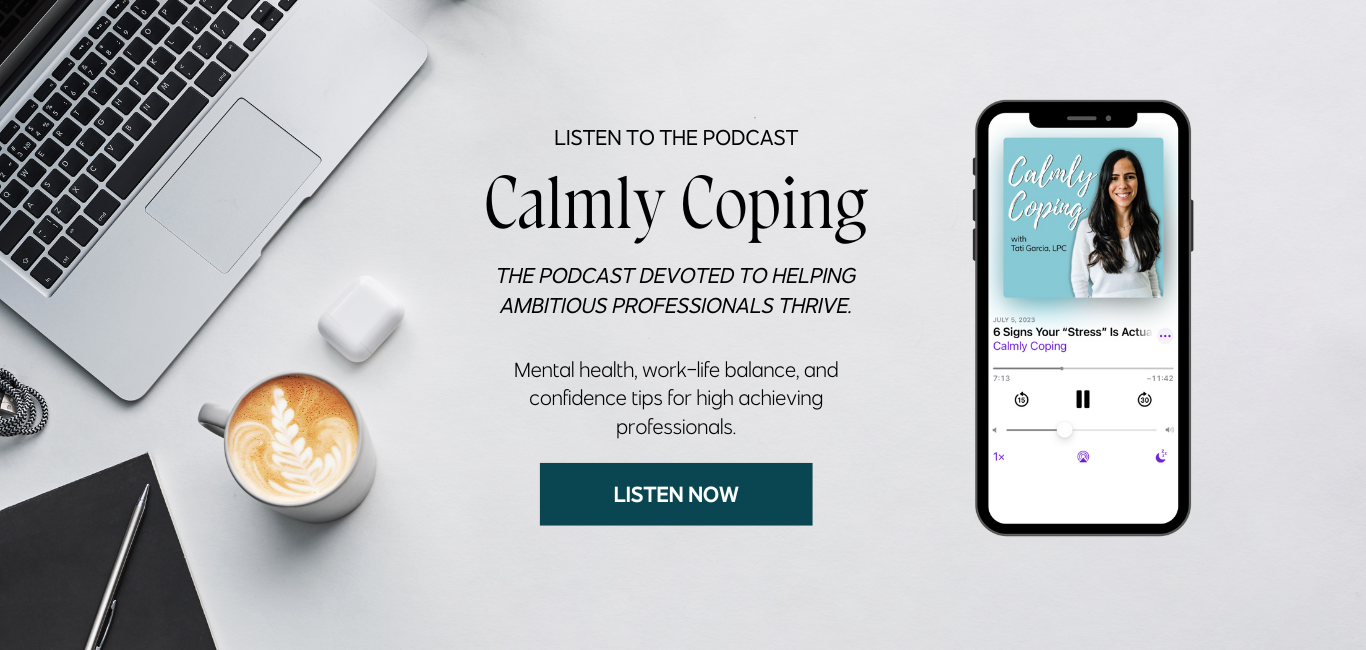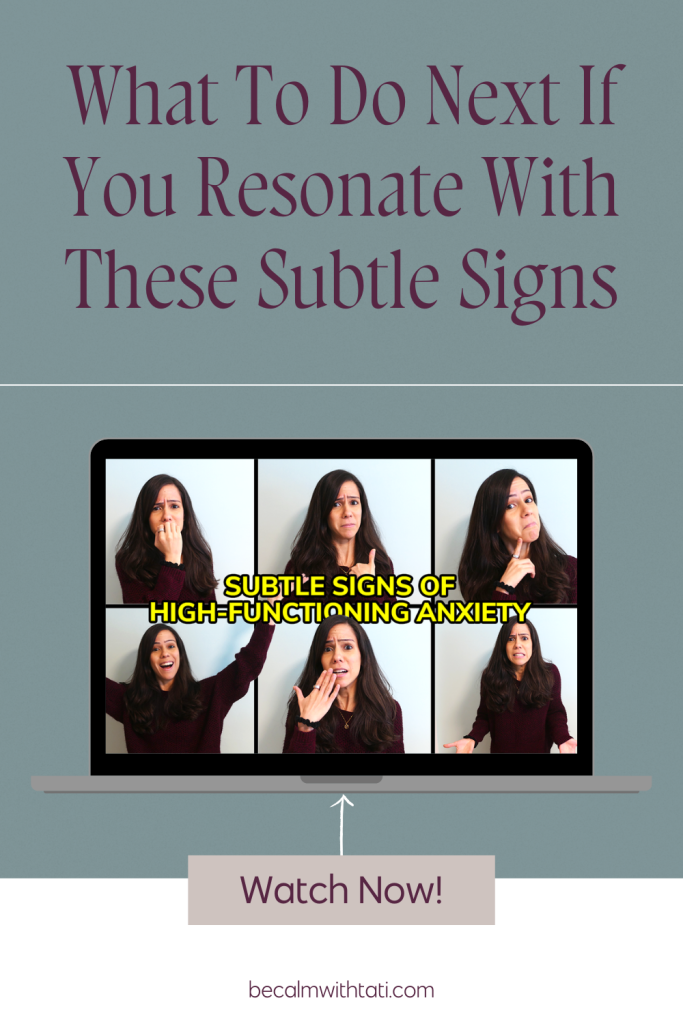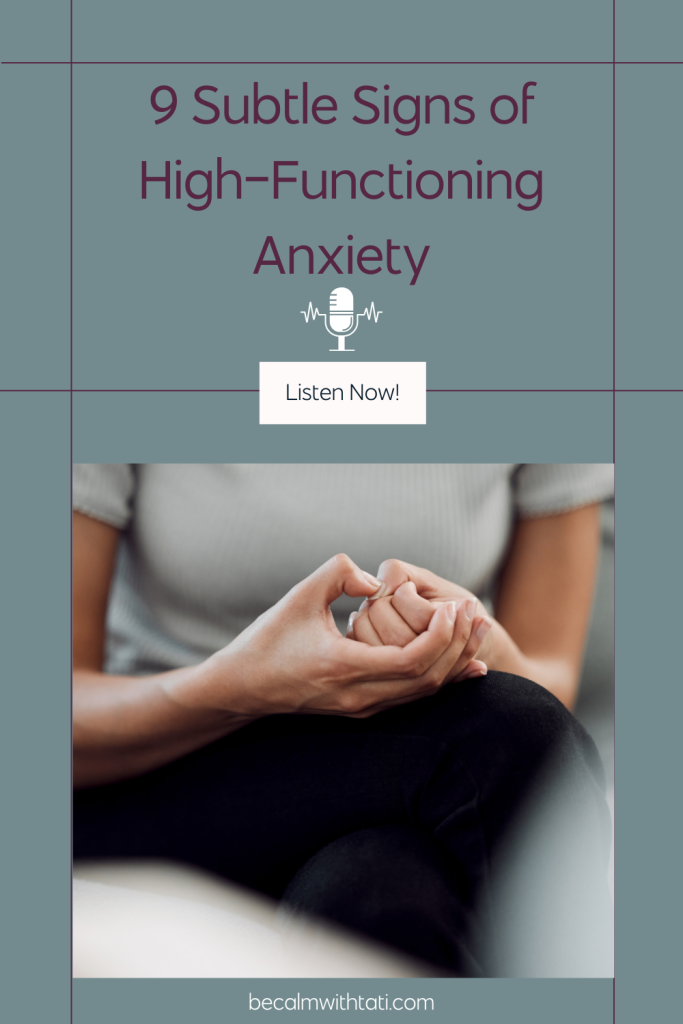High-functioning anxiety isn’t always just incessant overthinking or sleepless nights; sometimes, it shows up as the constant need to prove your worth, the subtle self-comparisons, or the relentless planning. These, often ever-present, behaviors and ways of thinking can be manifestations of your high-functioning anxiety. I’m a firm believer that awareness and understanding can help you stop struggling and begin thriving, so in today’s episode, we will delve into the more subtle signs of high-functioning anxiety to help you better understand yourself and pave the path toward healing.
In this episode, you will learn:
- 9 subtle, often overlooked indicators that you may be struggling with high-functioning anxiety
- The hidden toll that high-functioning anxiety can take on overall well-being
- What to do next if you can resonate with these subtle signs
LISTEN NOW:
🎧 CLICK HERE TO LISTEN TO CALMLY COPING WHEREVER YOU LISTEN TO PODCASTS
WATCH NOW:
FREE TRAINING: How to Create Work-Life Balance and Feel Calmer From Within
If you want to learn how to take back control of your life so you can feel calmer and more confident, and learn the tools to spend your time according to what matters most to you (no matter what your schedule is like right now)…

LISTEN, REVIEW, AND SUBSCRIBE TO THE PODCAST!

INTRO/OUTRO MUSIC: Rescue Me (Instrumental) by Aussens@iter (c) copyright 2018 Licensed under a Creative Commons Attribution (3.0) license. http://dig.ccmixter.org/files/tobias_weber/57990 Ft: Copperhead
DISCLAIMER: All content here is for informational purposes only. This content does not replace the professional judgment of your own mental health provider. Please consult a licensed mental health professional for all individual questions and issues.
Interested in diving deeper to get support for high-functioning anxiety?
I offer 1:1 coaching to help high-achievers overcoming high-functioning anxiety so they can feel calmer, more present, and have improved balance in their lives. Click here if you’re interested in learning more and getting started.
Calm, Balanced, & Confident is my comprehensive A→Z self-paced course to help high-achieving professionals overcome high-functioning anxiety so they can feel calmer, balanced, and more confident without the anxiety and overwhelm. Click here to learn more and enroll today.
Looking for ongoing support and guidance with high-functioning anxiety? The Calm & Ambitious Community is the exclusive community for high achievers with high-functioning anxiety. Click here to learn more and join us today!
TRANSCRIPT:
Click to view the episode transcript.
High functioning anxiety isn’t always incessant overthinking or sleepless nights. Sometimes it shows up as the constant need to prove your worth, the subtle self comparisons, or the relentless planning. These often ever present behaviors and ways of thinking can be subtle manifestations of your high functioning anxiety.
I’m a firm believer that awareness and understanding can help you stop struggling and begin thriving. So in today’s episode, we’ll delve into the more subtle signs of high functioning anxiety to help you better understand yourself and pave the path towards healing.
Welcome to calmly coping. My name is Tati Garcia. I’m a licensed therapist and coach specializing in high functioning anxiety. I help high achievers stop putting themselves last so they can feel more calm, balanced and confident. from within. If this topic interests you, then please like this video, subscribe and hit the notification bell so that you will be notified every time I release a new episode.
Thank you so much for tuning in. So high functioning anxiety is basically when you are somebody who is high achieving, you’re performing and functioning well on the outside, you’re able to go to work and often do very well at work. You’re often somebody who is. high achieving and getting all the things done.
However, that is contrasted on the inside. However, that is contrasted on the inside by an internal struggle of overthinking, of feeling anxious, of self doubt, of worrying about the future and the what ifs. And that can feel really uncomfortable. The thing with anxiety is that it’s not always the apparent panic attacks or the intense fear or dread of the future. And it can also manifest in more subtle ways in your behavior and the ways that you think about things as well as the way that you feel. So we’re going to talk more about that today. If you’re not sure whether or not you have high functioning anxiety, I have a free quiz that can help you figure that out.
You can go to hfaquiz.com or click on the link in the description or the show notes so that you can get access to that. Less than five minute quiz and you will also get personalized resources depending on your results The thing with high functioning anxiety is that it can be really hard to recognize because it tends to be hidden by a mask I just did a recent episode on this all about the mask of high functioning anxiety.
So go check that out I will also leave a card in the corner if you’re watching on youtube so you can check that out But it’s basically the idea that On the outside, you appear to be doing well. You are calm and successful. You appear competent to others. You may be a perfectionist. And so as a result, you create very high quality work.
So your struggles aren’t something that other people are necessarily gonna see. It’s not something that is outwardly visible. Now that is the case with anxiety in general. However, a lot of times when it comes to a diagnosable anxiety disorder, it’s something that is having a negative impact on your daily functioning and on your day to day.
So it can sometimes be more visible in ways of, let’s say, avoidance of certain things or experiencing intense feelings of physical symptoms that might make it harder for you to go about your day. It’s not to say that high functioning anxiety is comfortable and it’s something that feels good because it’s certainly not.
However, it’s just what highlights high functioning anxiety is that contrast between what’s on the outside versus what’s on the inside. It’s the idea that the people around you probably wouldn’t guess or suspect that you’re even struggling with anxiety, that you’re even struggling with constantly doubting yourself or overthinking things.
So now let’s dive into those subtle signs of high functioning anxiety. Number one is constant self comparison. So while appearing confident externally, those with high functioning anxiety tend to compare themselves to others often, and they may feel the need to measure up to certain standards because of their high expectations.
So this persistent comparison can lead to a lot of self doubt. It can feel like this feeling of I’m not doing enough or other people are doing better than me. And it can often be coming from a place of fear. Maybe it is a fear of failure, a fear of not measuring up. And so we can often look at other people and see, well, they’re doing more.
They’re accomplishing more, especially when it comes to the highlight reels of social media and that constant self comparison can leave you feeling worse about yourself. And then. leave you feeling more pressured to do more and that anxious energy could be driving you to continue working and pushing yourself harder in order to counteract those feelings of self doubt and insecurity.
Oftentimes, the clients that I work with feel this desire to prove themselves. So as though they need to prove that I do have it all together or I am qualified and this is often because of that deep insecurity that they may feel. And the second subtle sign is the inability or difficulty with saying no.
So people with high functioning anxiety may struggle to say no to additional responsibilities even when they’re overwhelmed. And this is because of the fear of missing out or maybe the fear of disappointing others. Ultimately, there is some fear of negative consequences that makes them feel as though I need to do more.
And so this can create this vicious cycle of always saying yes to more and then feeling more and more overwhelmed. And then as a result, feeling like you’re not doing enough or you’re not doing good enough because you have so many things on your plate. And then that reinforces those fears or those beliefs that, okay, I really am not good enough, or I really am not qualified enough, or I really am going to fail these things.
So it just becomes this vicious, perpetuating cycle. The third subtle sign is excessive. planning and rehearsing. Because those with anxiety are often thinking about the future and often rehearsing what could happen or what could go wrong and anticipating that something will go wrong, then that results in a lot of planning and thinking about the future or thinking about what’s coming next or rehearsing for what’s coming next, even if it’s mentally.
So it could be mentally just playing out what’s going to happen. in your mind in anticipation of what you feel like is going to happen. And that gives your brain this false sense of control like, okay, because I’m thinking about this and because I’m anticipating this, then I can stop bad things from happening, which just isn’t reality.
And oftentimes that anticipation, the excessive planning, the excessive rehearsing makes you just feel more. anxious about the thing that’s coming up because you’re often focusing on the negative of what could happen. This can also look like literally planning and getting stuck in a place of procrastination or paralysis by analysis because you are stuck in that planning phase because you’re afraid of failure or what could happen if you move forward and do the thing that you’re feeling nervous about.
And this can be a way to cope with that fear of the unknown or the fear of what ifs, what could go wrong and what could happen. Another subtle sign of high functioning anxiety is over apologizing. So this can be apologizing excessively even for minor things, even for things that aren’t even your fault.
That feeling like you need to say sorry because you don’t want people to be mad at you or to look at you differently or to perceive you in the wrong way. And so then you apologize, but really afterwards you think, well, this wasn’t even really my fault. Why did I apologize? And it becomes this automatic habit that you’re not even consciously aware of.
It could be linked with a heightened sense of responsibility, feeling like. everything falls on your shoulders and so you need to keep the people around you comfortable or you need to be on top of things constantly or you need to take care of every person around you and combat all the problems because you’re afraid of what could happen if something goes wrong.
And that fear of negative consequences makes you feel this internal sense that all of it falls on you. And then of course that behavior is the apologizing, the going above and beyond to help other people. Another subtle sign is inner restlessness. So it’s that feeling like you always need to be busy, you always need to be doing more, you can’t just sit down and relax and just let go because there’s always this inner drive that I’m missing something or I need to fix something or I need to keep doing this or I need to check these things off of my to do list. It could also be a literal fidgeting. It could be, you know, tapping your foot or shaking your hand or anything that is a sign of that inner restlessness that you’re feeling. Another subtle sign that I kind of touched on in the excessive planning and rehearsing, but this is using procrastination as a coping mechanism.
So instead of avoiding tasks altogether, those with high functioning anxiety, may engage in procrastination as a way of managing that anxiety. So they may feel like I need to do this thing perfectly, but then it feels so insurmountable or overwhelming that they procrastinate as a result and then start to beat themselves up.
Think, well, how come I can’t get this started? How come I don’t have the motivation? What’s wrong with me? And then that inner negative dialogue makes it harder to continue going. And this can also result in delaying things to the last minute and using that kind of drive of this needs to get done, the deadline in order to get tasks done.
And then really, it’s that. anxiety, that pressure that’s pushing you forward and propelling you. And that also reinforces the idea that many people with high functioning anxiety unconsciously have that they need to feel anxious and that fear needs to drive and propel their actions rather than coming from a place of groundedness and intentionality.
Another subtle sign of high functioning anxiety are subtle physical symptoms. It could be you clenching your jaw or tensing your muscles or headaches. Things that maybe aren’t extremely evident or apparent like would be in a panic attack where there is a strong intense feeling of your heart. beating really quickly and you’re sweating and you’re feeling really uncomfortable, but it’s more of those day to day subtle signs and symptoms often coming from a place of tension.
Sometimes it can be maybe you grind your teeth at night or you just feel a soreness in your jaw because you tend to clench your teeth. together when you’re stressed, or you have soreness in certain areas of your body because you tend to tense those muscles when you start to feel overwhelmed. These are things that our body is doing automatically, and we may not even recognize until it starts to exhibit itself through pain and discomfort.
And this can often be because emotions are ways of telling your body to take action. And so when you’re anxious, your body gets into this state where it wants to take action to either physically flee whatever the danger is because your body is reacting in the same way to physical danger, like a lion chasing you, as it would to a perceived danger, like you worrying about what’s going to happen tomorrow.
And when you don’t have the opportunity to release that energy or get out that. physical buildup that’s occurring, then it’s going to result in a lot of physical tension. So another subtle sign is compulsive overachievement. So I talked about how those with high functioning anxiety tend to be those who are ambitious and high achieving.
The drive to compulsively overachieve and accomplish more and more and more may be occurring in those with high functioning anxiety because of this intense fear of failure. It can be a way of validating your self worth. And by that, I mean that in order to feel good about myself, I need to accomplish this thing.
I need to check this thing off the list. I need to get this degree. I need to get this promotion. I need to make this certain amount of money. But oftentimes, because you are looking for external achievements to fill this internal hole that you feel, then it’s going to feel like it’s never enough. And another subtle sign of high functioning anxiety is seeking reassurance from others.
So, this can be even for minor decisions, because there’s a lot of self doubt and overthinking going on, then you may doubt your own ability to make decisions or to think clearly about things. So, you might seek reassurance from those around you, such as, Am I making the right decision? What should I do about this?
Or, What should I order for dinner? So, it’s even those small decisions that you feel doubtful about, because you have this strong voice within your mind that’s saying, Oh, what if you make the wrong decision, or what if you say something stupid, or whatever it is. And it’s that desire to alleviate that self doubt and gain validation.
What if you resonated with some or all of these signs? Then there is hope, I promise. There are things you can do to change these behaviors so that, you know, even these subtle things can be Signs that something bigger is going on and once you can recognize that then you can address the root causes of them So to get started I suggest that you recognize while it’s happening So you can go through this episode and take notes on what you noticed what behaviors and then just go through one by one Maybe pick one per week or one for a few days and start to notice what’s happening and then question What’s going on when this behavior is happening?
What is driving this behavior? Is there fear under the surface? Am I worried about something going wrong? Am I thinking negative thoughts about myself? And also, I want you to practice self-compassion. This is the act of being kind to yourself and recognizing that it’s okay to feel this way. It’s okay to have these struggles, and you’re not gonna feel this way forever.
And so this is the act of. Speaking to yourself like you would to a friend and giving yourself that kindness and support. And if you’re looking for more support on how to overcome high functioning anxiety, have a free training that will walk you through my three phase process of getting to the root of your struggle so you can create work life balance, feel calmer from within, and have inner confidence.
You can learn more about this training by going to CalmlyCoping.com/workshop. You can also click on the link in the description or in the show notes depending on where you’re watching. The training is called How to Create Work Life Balance and Feel Calmer from Within as a High Achieving Professional Without Sacrificing Your Success.
And let’s continue the conversation on this I’d love to hear your thoughts on this question. If you are watching on YouTube or if you are listening on Spotify, let me know which subtle sign of high function anxiety resonates with you the most. And while you wait for next week’s episode, I have other episodes about calming your mind, creating work life balance and feeling more confident from within.
So you can check out these episodes here. Thank you so much for tuning in today and until next time, be calm.


Until next time…













